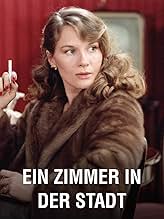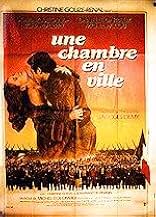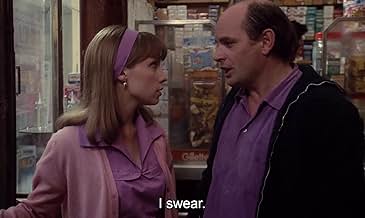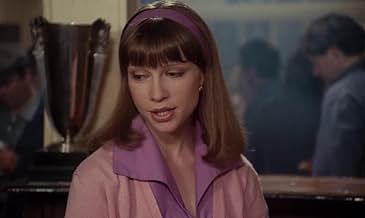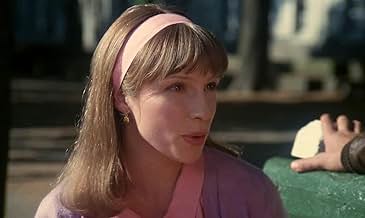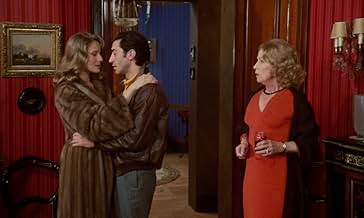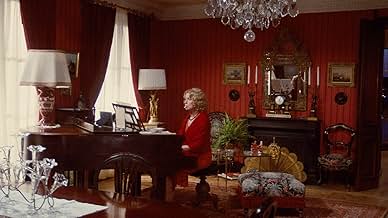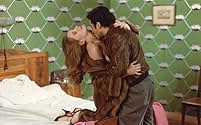VALUTAZIONE IMDb
6,7/10
1795
LA TUA VALUTAZIONE
Un operaio in sciopero si innamora della figlia della sua padrona. Entrambi sono già impegnati, ma il desiderio brucia. Tra classi e bugie, scoppia una passione impossibile.Un operaio in sciopero si innamora della figlia della sua padrona. Entrambi sono già impegnati, ma il desiderio brucia. Tra classi e bugie, scoppia una passione impossibile.Un operaio in sciopero si innamora della figlia della sua padrona. Entrambi sono già impegnati, ma il desiderio brucia. Tra classi e bugie, scoppia una passione impossibile.
- Premi
- 3 vittorie e 10 candidature totali
Florence Davis
- Edith
- (voce (canto))
Recensioni in evidenza
How I never saw this movie and when the first line was spoken in singing way, I realize be treat a musical, not a classic musical as we get used to, just sung in every line, well it really weird to watch a movie, I love the ultimate musical "Les Miserables", taking in account the level of the budge they differ each other so much, "Une Chamble en Ville" is a small production a slow pace, sometimes still boring, nevertheless the story is great, the tragic tale took place at Nantes, during shipyard's strike (Which the French people loves to do) a humble worker François (Richard Berry) rent a room from a former Countess Margot (Danielle Darrieux) she has an unsatisfied married daughter Edith (Dominique Sanda in bold nudes scenes) due her husband Edmond (Michel Piccoli) actually is sexually impotent, in other hand François has been dating with Violette, who was pregnancy from him without notice by him, in fact François didn't love her, when he meets Edith the chemistry is overpowering and ends up in love night at cheap hotel, then all these facts are interwoven each other, a tragic tale sang on every line, fine movie, although it wasn't allowed to everyone!!!
Resume:
First watch: 2020 / How many: 1 / Source: DVD / Rating: 7.25
Resume:
First watch: 2020 / How many: 1 / Source: DVD / Rating: 7.25
6hhg2
I checked out this movie because of Demy's earlier works, Lola (1961), The Umbrellas of Cherbourg (1964), and The Young Girls of Rochefort (1967), all of which I found charming and interesting. Demy has an unmistakable visual sense and makes expressive use of vivid color imagery. All of those films also had playful plot lines that did not always follow logic, order, or even reason. Instead a whimsical, airy feeling often permeated the films.
So, I do not expect, nor demand, that movies have precise plots that always follow order, but Une Chambre really tests that to the limit. The actions of the characters are mystifyingly foolish, as if they were undertaken by five-year-olds, with zero understanding of human emotions or consequences of action. Timelines are compressed beyond belief. This movie makes TV soap operas seem logical, rational, and reasonable! I found myself asking: did that character really do that? Did she really believe that would happen? On what planet might that actually take place.
On the plus side, the singing of dialog was interesting (and was used in his earlier films). The visual style was still strong. However, unless you are a film buff who requires to see all of a director's work, I'd suggest passing on this one. A rating of 6 might be generous, and I wrestled with giving it a 5, but I did like his other films.
So, I do not expect, nor demand, that movies have precise plots that always follow order, but Une Chambre really tests that to the limit. The actions of the characters are mystifyingly foolish, as if they were undertaken by five-year-olds, with zero understanding of human emotions or consequences of action. Timelines are compressed beyond belief. This movie makes TV soap operas seem logical, rational, and reasonable! I found myself asking: did that character really do that? Did she really believe that would happen? On what planet might that actually take place.
On the plus side, the singing of dialog was interesting (and was used in his earlier films). The visual style was still strong. However, unless you are a film buff who requires to see all of a director's work, I'd suggest passing on this one. A rating of 6 might be generous, and I wrestled with giving it a 5, but I did like his other films.
'Une chambre en ville' was thoroughly underrated from the start. In 1982 audiences no longer favoured tragic movies. BUT WHY? A generation earlier television had strongly reduced the audience of the cinemas. But television had NOT changed the taste. Video had a more profound influence. Take a standard situation. A group is watching a video which may evoke strong emotions in some of the spectators. Suddenly another catches the remote control, rewinds the movie and makes some comment (e.g., 'Girls should never have such a coiffure'). Repeated exposure to experiences of this kind may reduce the capacity for becoming emotionally aroused by movies. - Note that this is a recent development. It is easy to assemble a list of 100 very tragic movies produced 1935-1965, which at that time were highly appreciated by the average film-goer. I am even convinced that the average film-goer of this period would have loved contemporary movies such as 'Stormy Weather' (by Solveig Anspach) and 'Les diables' (by Christophe Ruggia).
If your aim is not emotional experience, you are likely to be disappointed by 'Une chambre en ville', despite its excellent merits. But please note that my review is one-sided and might be misleading. I intend to say much about the music, and shall reduce all other aspects to the bare minimum. What is the plot? Workers are striking. During a demonstration one of them (Francois) is shot by the police. He dies in the arms of his beloved (Edith). But only one day earlier he had abandoned his pregnant girlfriend (Violette), because he had met a very beautiful over-class girl. Francois and Edith were immediately overwhelmed by genuine and reciprocal passion.
Even among film musicals it is infrequent that every line is sung. Hence, it is natural to compare 'Une chambre en ville' with 'Les parapluis de Chèrbourg'. Jacques Demy directed both. But different composers (Michel Colombier and Michel Legrand) wrote the music. I think both got the manuscript most suitable for their specific talent.
The music of 'Une chambre' differs from that of 'Les parapluis' foremost in three respects. Without ceasing to be real film music, it is more introverted, and it is closer to opera music. But the largest difference is the director's relation to the singers.
Whenever two persons sing simultaneously in 'Les parapluis', you can clearly perceive the words of each. Also, simultaneous singing never transgresses the kind of dialogues that may be found in purely spoken theatre. By contrast, 'Une chambre' contains a real duet: the loving couple sings the same text together in parallel sixths; a device clearly borrowed from the opera. - - - To avoid misunderstanding as regards my next point: numerous great composers have borrowed melodies or other things from each other. Borrowing is not a fault if the borrowed thing is used for new purposes. Since 'Une chambre' finishes with a love scene in which one of the couple dies, it is not far-fetched to associate to Wagner's 'Tristan and Isolde'. During the final scene of the movie the main musical theme is presented for the fourth time, and this time with new accompanying melodies played by the orchestra. Rightly or wrongly, I think that these melodies are to some extent inspired by Wagner's opera (bar 63-73 of the overture).
Any competent musical conductor would tell the singers to take some impression of the mood of the text. But the soundtrack of 'Les parapluis' never differs much from a neutral performance. Hence, it is hardly possible to decide whether or not Jacques Demy actually directed the singers before the soundtrack was made. But in 'Une chambre' it could hardly be more manifest that Demy has devoted as much direction to the singers as to the actors seen on the screen. From Violette's singing voice alone, no one could mistake her distress when Francois abandons her, and her feeling of being treated unjust when Francois tries to excuse his behaviour. - - - Suppose you do not understand French, and that you are listening to the soundtracks of both movies without seeing the pictures. You will nevertheless have a fair chance of correctly perceiving the emotions of many scenes of 'Une chambre'. You will be much less successful with 'Les parapluis'.
If your aim is not emotional experience, you are likely to be disappointed by 'Une chambre en ville', despite its excellent merits. But please note that my review is one-sided and might be misleading. I intend to say much about the music, and shall reduce all other aspects to the bare minimum. What is the plot? Workers are striking. During a demonstration one of them (Francois) is shot by the police. He dies in the arms of his beloved (Edith). But only one day earlier he had abandoned his pregnant girlfriend (Violette), because he had met a very beautiful over-class girl. Francois and Edith were immediately overwhelmed by genuine and reciprocal passion.
Even among film musicals it is infrequent that every line is sung. Hence, it is natural to compare 'Une chambre en ville' with 'Les parapluis de Chèrbourg'. Jacques Demy directed both. But different composers (Michel Colombier and Michel Legrand) wrote the music. I think both got the manuscript most suitable for their specific talent.
The music of 'Une chambre' differs from that of 'Les parapluis' foremost in three respects. Without ceasing to be real film music, it is more introverted, and it is closer to opera music. But the largest difference is the director's relation to the singers.
Whenever two persons sing simultaneously in 'Les parapluis', you can clearly perceive the words of each. Also, simultaneous singing never transgresses the kind of dialogues that may be found in purely spoken theatre. By contrast, 'Une chambre' contains a real duet: the loving couple sings the same text together in parallel sixths; a device clearly borrowed from the opera. - - - To avoid misunderstanding as regards my next point: numerous great composers have borrowed melodies or other things from each other. Borrowing is not a fault if the borrowed thing is used for new purposes. Since 'Une chambre' finishes with a love scene in which one of the couple dies, it is not far-fetched to associate to Wagner's 'Tristan and Isolde'. During the final scene of the movie the main musical theme is presented for the fourth time, and this time with new accompanying melodies played by the orchestra. Rightly or wrongly, I think that these melodies are to some extent inspired by Wagner's opera (bar 63-73 of the overture).
Any competent musical conductor would tell the singers to take some impression of the mood of the text. But the soundtrack of 'Les parapluis' never differs much from a neutral performance. Hence, it is hardly possible to decide whether or not Jacques Demy actually directed the singers before the soundtrack was made. But in 'Une chambre' it could hardly be more manifest that Demy has devoted as much direction to the singers as to the actors seen on the screen. From Violette's singing voice alone, no one could mistake her distress when Francois abandons her, and her feeling of being treated unjust when Francois tries to excuse his behaviour. - - - Suppose you do not understand French, and that you are listening to the soundtracks of both movies without seeing the pictures. You will nevertheless have a fair chance of correctly perceiving the emotions of many scenes of 'Une chambre'. You will be much less successful with 'Les parapluis'.
UNE CHAMBRE EN VILLE is much darker and harsher than Demy's more famous films from the 1960s, but it is no less stunning a piece of work. An operatic look at classicism and desire, its peopled by fascinating, layered characters who are sometimes openly unlikable. The music is not at all like Michel Legrand' jazzy, hummable tunes, but this is meant to work within the confines of this grand and melodramatic narrative.
Workers during a strike prepare and perform a demonstration, and two personal relations develop against this background. François (Richard Berry) abandons his pregnant girlfriend Violette (Fabienne Guyon, appropriately dressed in violet), and meets a very beautiful upper class girl, Edith (Dominique Sanda).
This was my first experience with Jacques Demy, and I was immediately smitten. The backdrop recalls something like "Les Miserables", based on Demy's own witnessing of a shipyard strike, though the focus here is much more on the love triangle, and Francois Guilbard is not the tragic character that Jean Valjean is (in fact, Francois is kind of a rat).
Musicals are not my favorite genre, but I think this was done right... every line sounds amazing, and it works to have it done without any speaking. The dark themes even hark back to classic operas more than the saccharine musicals of modern Hollywood. Where the plot may be less than perfect, it is made up for by the mere presence of such striking and talented actors.
Unfortunately for Demy, many consider his best years 1961-1967, with the exception of "Donkey Skin" (1970) and completely disregard this film. Despite being nominated for nine Cesars (basically the French Oscars), it won none of them.
This was my first experience with Jacques Demy, and I was immediately smitten. The backdrop recalls something like "Les Miserables", based on Demy's own witnessing of a shipyard strike, though the focus here is much more on the love triangle, and Francois Guilbard is not the tragic character that Jean Valjean is (in fact, Francois is kind of a rat).
Musicals are not my favorite genre, but I think this was done right... every line sounds amazing, and it works to have it done without any speaking. The dark themes even hark back to classic operas more than the saccharine musicals of modern Hollywood. Where the plot may be less than perfect, it is made up for by the mere presence of such striking and talented actors.
Unfortunately for Demy, many consider his best years 1961-1967, with the exception of "Donkey Skin" (1970) and completely disregard this film. Despite being nominated for nine Cesars (basically the French Oscars), it won none of them.
Lo sapevi?
- QuizDemy's longtime collaborator, composer Michel Legrand, strongly opposed the movie's social themes and urged the director to not do the movie. He ended up not being associated with the movie at all, and even in the 2010s, he was still trashing the movie in interviews.
- BlooperAround 01:11:53, Edith is holding a fire gun. Around 01:11:57, Edith is holding her bag and puts a tissue around her hand. However, she hasn't received a razor cut.
- Citazioni
Madame Pelletier: [singing] You worry too much about me. Think of yourself first, of your own life. I've lived mine.
- ConnessioniFeatured in Garage Demi (1991)
I più visti
Accedi per valutare e creare un elenco di titoli salvati per ottenere consigli personalizzati
- How long is A Room in Town?Powered by Alexa
Dettagli
- Data di uscita
- Paese di origine
- Lingua
- Celebre anche come
- A Room in Town
- Luoghi delle riprese
- Place du Commerce, Nantes, Loire Atlantique, Francia(Where Violette goes to look for Guilbaud)
- Aziende produttrici
- Vedi altri crediti dell’azienda su IMDbPro
- Tempo di esecuzione
- 1h 30min(90 min)
- Colore
- Mix di suoni
- Proporzioni
- 1.66 : 1
Contribuisci a questa pagina
Suggerisci una modifica o aggiungi i contenuti mancanti

![Bande-annonce [OV]](https://m.media-amazon.com/images/M/MV5BZGRhNTBmNzItZGNjMS00N2Y4LTkwODgtZjhjNTUxYjBiZmJmXkEyXkFqcGdeQXRyYW5zY29kZS13b3JrZmxvdw@@._V1_QL75_UX500_CR0)
